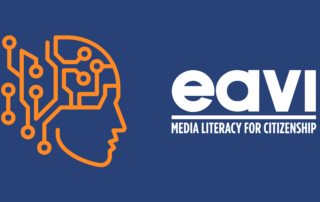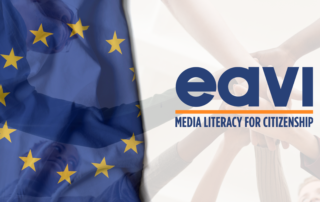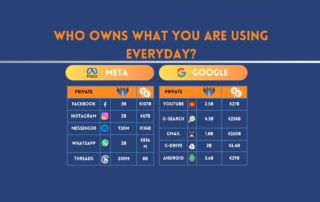EAVI’s Pioneering Role in Advancing Media Literacy in the EU
At EAVI, we are pleased to observe that the Communication from the Commission dated February 2023, titled “Guidelines pursuant to Article 33a(3) of the Audiovisual Media Services Directive on the scope of Member States' reports concerning measures for the promotion and development of media literacy skills”, acknowledges the studies conducted by EAVI. These studies are referred to as useful resources to assist the Member States in evaluating media literacy levels. We appreciate the recognition of our efforts in contributing to the advancement of media literacy initiatives. Indeed, media literacy is an important subject [...]
The Threat of AI-Generated Disinformation to European Elections and Democracy
In view of the elections that will be held in 2024 in the EU and other parts of the world including the US and UK, there are various challenges to democratic processes as technological advancements are on the rise. It is argued that electoral periods and times of political crisis serve as fertile ground for the production and dissemination of AI-generated content, heightening concerns about the impact on public perception and democratic processes. Recent instances have demonstrated the alarming potential of AI to enable the production of deceptive narratives, with such disinformation finding [...]
AI Hallucination: When AI Makes Things Up
The word “hallucinate” was announced as the word of the year by the Cambridge Dictionary in 2023. It means “to seem to see, hear, feel, or smell something that does not exist, usually because of a health condition or because you have taken a drug”. The term "hallucination" originates from the Latin word "alucinari," meaning to wander in the mind. Yet, the Cambridge Dictionary added another definition for the word that signifies the emergence of a new phenomenon: “When an artificial intelligence hallucinates, it produces false information”. This indicates that AI may have [...]
The Relevance of Chomsky’s Media Theory in Today’s Digital Landscape: Media Ownership
In an era dominated by social media and big tech giants, the concentration of media ownership has become more important than ever. The infographic above depicts the ownership landscape of major platforms and reveals an interesting truth that media control lies in the hands of a few, steering the narratives that reach billions of users worldwide. This phenomenon echoes the sentiments expressed by the famous linguist and philosopher Noam Chomsky in his ground-breaking media theory, specifically his first filter of the “Five Filters of the Mass Media,” the ownership. Chomsky’s media theory, often referred [...]
Data Literacy in the Age of Datafication: A Package to Understand How Digital Technology Treats Us
The complexity of technology, coupled with the emergence of datafication, presents new challenges for society to understand how the world works. Artificial intelligence and big data are just a few examples of the advanced technologies we have to deal with. However, both show the same trend, which is the increasingly important role of data in decision-making. Decision-making is now also automated. This process relies on technologies such as deep learning and the availability of large, real-time data to provide insight, and new knowledge to make policies. One of the easiest examples of the datafication [...]
“Using Media Literacy to Fight Digital Fake News in Later Life: A Mission Impossible?”
Media Literacy Training for Seniors to Fight Fake News The European Commission defines disinformation as “false or misleading content that is spread with an intention to deceive or secure economic or political gain,” whereas misinformation refers to the same kind of content shared without harmful intention, regardless of its consequences. Disinformation is commonly referred to as ‘fake news,’ and it seriously threatens the credibility of information sources and causes public harm on many layers. Media literacy training functions as a strong instrument used to combat the spread of false information by empowering citizens [...]
JOIN US!
EAVI HAS THREE OPEN POSITIONS! Work Model (remote/in-office/hybrid): Flexible | Commitment Type (full-time/part-time): Flexible Start Date and Duration: Flexible | Applications: Rolling admission About EAVI: EAVI, the European Association for Viewers Interests, is a leading international non-profit association working in the fields of media literacy and citizenship. Our offices are based in the EU Quarter, Brussels. For information about what we do, please check our website. If you are a continuing master's degree student or a graduate volunteer who is interested in media literacy and looking for some experience in the European Quarter, [...]
Are you aware of your Digital Footprint?
Recently, EAVI and the European Digital Learning Network (DLEARN), in collaboration with Prof. Przemek Sękalski of the Technical University of Lodz, worked together in developing an EU survey that analyses citizens awareness regarding their digital footprint. The survey aims to analyse how much control participants exercise over this digital footprint and how much control they wish they could have as well are looking at the safety aspects they would like to see in place in the future! The aim is to study the results to highlight potential areas in education and training that could be [...]
Online Shopping – A Cautionary Tale in Four Letters
This week, our very own communications officer demonstrated the necessity of paying attention when ordering online. We give to you this rollercoaster of events in four emails. To: Customer Service 00.14AM 29 August 2018 Dear sir I recently ordered a package from [Retailer]. It was to be delivered by [Courier] this evening. The [Courier] parcel tracker service tells me that a delivery attempt was made this evening. However, I have been in all evening, working at my computer, at a window which faces out onto the road, in silence, and with my dog beside me. [...]





























































































































































